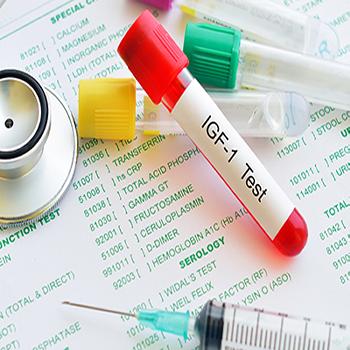What is IGF-1?
Insulin-like growth factor 1 (IGF-1) is a hormone that mediates the actions of growth hormone, promoting normal growth of bones and tissues.
Purpose of the Test:
- To evaluate and monitor growth hormone disorders in both children and adults.
Conditions Detected and Monitored:
- GH Deficiency:
- In Children: Essential for normal growth; deficiency can lead to slower growth and shorter stature.
- In Adults: Can result in low bone density and reduced muscle mass.
- GH Insensitivity (Laron Syndrome):
- A rare genetic disorder causing the body to be unable to utilize growth hormone, resulting in slowed growth and shorter height.
- Gigantism:
- A childhood disorder characterized by excessive growth hormone production, leading to above-average height and large extremities.
- Acromegaly:
- An adult condition marked by excessive growth hormone leading to thickened bones and enlarged hands, feet, and facial features.
Test Procedure:
- A blood sample is collected, typically in a healthcare setting. The results will help determine if IGF-1 levels are within the normal range or indicate an underlying disorder.
Importance of Monitoring:
- Understanding IGF-1 levels can help guide treatment options for individuals with growth hormone-related conditions, ultimately improving quality of life and health outcomes.
Why would I need an IGF-1 Test?
An IGF-1 test may be recommended for several reasons, including:
Evaluating growth disorders: To diagnose or monitor growth disorders in children, such as growth hormone deficiency, which may cause short stature or delayed growth.
Assessing acromegaly: In adults, high IGF-1 levels may indicate acromegaly, a condition in which too much growth hormone is produced, leading to abnormal bone and tissue growth.
Investigating pituitary gland function: The test can help assess the function of the pituitary gland, which produces growth hormones.
Monitoring growth hormone therapy: The IGF-1 test helps monitor the effectiveness and safety of treatment for individuals receiving GH therapy.
Evaluating suspected GH excess or deficiency: To help confirm conditions associated with excessive or insufficient GH production.
